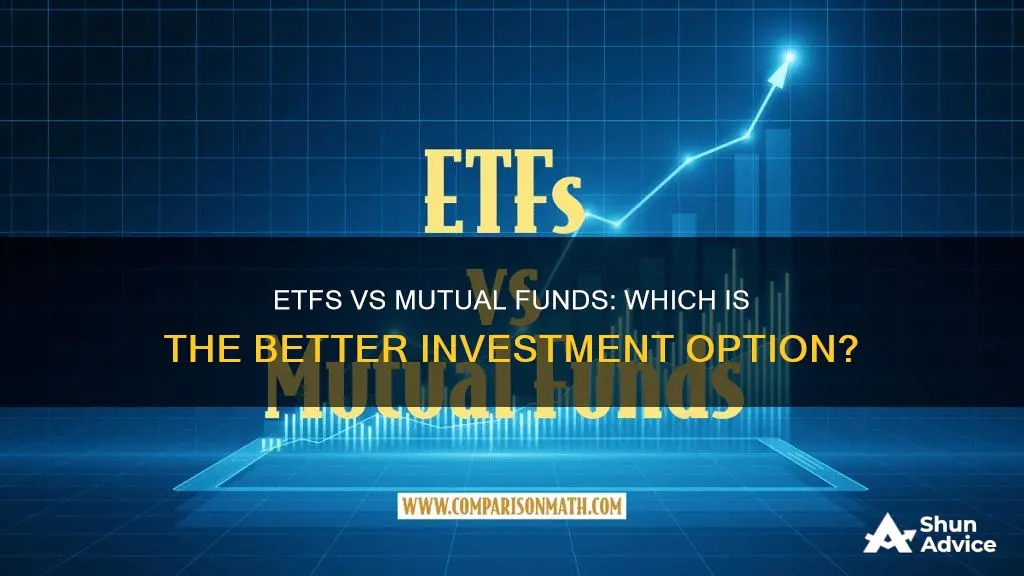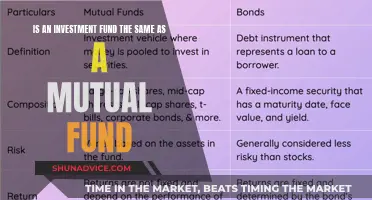
Exchange-traded funds (ETFs) and mutual funds are both managed baskets of individual securities, such as stocks and bonds, that offer exposure to a wide variety of asset classes and niche markets. They are both less risky than investing in individual stocks and bonds and are managed by experts. However, there are some key differences between the two that investors should be aware of when deciding where to put their money.
| Characteristics | Values |
|---|---|
| Trading characteristics | ETFs are traded on stock exchanges and can be bought and sold throughout the day at market prices, similar to stocks. Mutual funds trade only once per day after the markets close, and all investors on the same day receive the same price. |
| Pricing factors | ETFs are bought and sold at the market price, which can fluctuate throughout the day. Mutual funds are bought and sold at the net asset value (NAV), which is calculated after the market closes. |
| Tax implications | ETFs are generally more tax-efficient than mutual funds due to their lower turnover and ability to use the in-kind creation/redemption mechanism to minimize capital gains. |
| Management style | Most ETFs are passively managed, tracking a particular index. Mutual funds can be actively or passively managed, but most are actively managed. |
| Investment minimums | ETFs do not require a minimum initial investment and can be purchased as whole shares or fractional shares. Mutual funds usually have a minimum initial investment, which can range from a few hundred to thousands of dollars. |
| Expense ratios and fees | ETFs typically have lower expense ratios, especially if they are passively managed. Mutual funds often have higher expense ratios, especially if they are actively managed. Mutual funds may also have sales loads or other fees. |
What You'll Learn
- ETFs are bought and sold on an exchange throughout the day, mutual funds can be bought or sold only once a day
- ETFs are often more tax-efficient than mutual funds
- ETFs are generally more flexible than mutual funds
- Mutual funds can be purchased without trading commissions
- ETFs are often more transparent than mutual funds

ETFs are bought and sold on an exchange throughout the day, mutual funds can be bought or sold only once a day
Exchange-Traded Funds (ETFs) and mutual funds are similar in many ways. Both are professionally managed "baskets" of individual stocks or bonds that offer exposure to a wide variety of asset classes and niche markets. They are both less risky than investing in individual stocks and bonds and provide built-in diversification. However, there are some key differences between the two.
ETFs are bought and sold on a stock exchange throughout the trading day, experiencing price changes throughout. This means that the price at which you buy an ETF will likely differ from the prices paid by other investors. They are also generally more tax-efficient than mutual funds, as they are passively managed and don't change their holdings that often. ETFs also do not require a minimum initial investment and are purchased as whole shares.
On the other hand, mutual funds are generally bought directly from investment companies instead of from other investors on an exchange. Mutual fund orders are executed once per day, with all investors who put in orders on the same day receiving the same price. This price is calculated after the trading day is over. Mutual funds also allow for automatic and recurring investments, which can be beneficial for those trying to establish a consistent investing pattern.
Mutual Funds vs Real Estate: Where Should You Invest?
You may want to see also

ETFs are often more tax-efficient than mutual funds
When it comes to tax efficiency, ETFs often outperform mutual funds. This is due to their lower turnover and ability to use the in-kind creation/redemption mechanism to manage the cost basis of their holdings. ETFs are passively managed and don't change their holdings as often, resulting in fewer capital gains for investors.
Mutual funds, on the other hand, may trigger capital gains taxes for shareholders when securities are sold within the fund. Actively managed mutual funds tend to have higher tax costs due to frequent trading, leading to more taxable capital gains. The more trading activity in a mutual fund, the higher the taxes.
ETFs are also more tax-efficient because they are traded on exchanges and can be bought and sold throughout the day, similar to stocks. This means their price can fluctuate during the trading day, and investors can take advantage of price movements. In contrast, mutual funds are bought and sold only once a day at the latest closing price, limiting investors' ability to manage their tax liability.
Additionally, ETFs do not require a minimum initial investment, making them more accessible to investors. The ability to buy a single share of an ETF means that investors can purchase them without a large upfront cost.
However, it is worth noting that mutual funds have their advantages too. They can be purchased without trading commissions and may be more suitable for investors who want to invest the same dollar amount automatically at regular intervals.
In summary, ETFs are often more tax-efficient than mutual funds due to their lower turnover, ability to manage the cost basis of holdings, and flexible trading options. However, both investment options have their advantages, and the best choice depends on an investor's goals, risk tolerance, and investment strategy.
Banks' Investment Strategies: Where Do They Invest Deposits?
You may want to see also

ETFs are generally more flexible than mutual funds
Exchange-traded funds (ETFs) are generally more flexible than mutual funds. Here are some reasons why:
Liquidity and Trading
ETFs are traded on a stock exchange and can be bought and sold throughout the day, offering intraday liquidity. This means that investors can react to market movements as they happen, buying or selling at any time during the trading day. In contrast, mutual funds can only be bought or sold once per day, after the close of trading, which may result in costly delays for investors.
Control Over Pricing
ETFs provide real-time pricing, allowing investors more hands-on control over the price of their trades. They also enable the use of more sophisticated order types, such as limit orders, stop orders, and stop-limit orders, giving investors greater control over their purchase or sale prices.
Automatic Investments and Withdrawals
Mutual funds allow for automatic investments and withdrawals, which can be set up to occur at specified frequencies (monthly, quarterly, or annually). This "set it and forget it" approach simplifies the investment process for those who wish to invest regularly.
Minimum Investment
ETFs do not require a minimum initial investment and can be purchased for the price of a single share, making them more accessible to investors with limited funds.
Tax Efficiency
ETFs are often more tax-efficient than mutual funds due to their lower turnover and ability to use the in-kind creation/redemption process to manage the cost basis of their holdings. Mutual funds, on the other hand, may trigger capital gains taxes for shareholders even if their investment has decreased in value since they first bought it.
Transparency
ETFs typically disclose their holdings regularly and frequently, providing investors with greater transparency about what they are investing in and where their money is allocated. Mutual funds, on the other hand, are only required to disclose their holdings quarterly, with a 30-day lag, offering less transparency to investors.
Commissions
In recent years, many trading platforms have started offering commission-free ETF trading programs, reducing costs for investors.
Suitability for Certain Markets
Actively managed mutual funds may be more suitable for less efficient or emerging markets, where active managers can attempt to take advantage of price inefficiencies to boost returns.
Broader Applicability
ETFs are generally considered more flexible and are suitable for a broader range of investors. Those who wish to trade intraday, favour lower expense ratios, seek tax efficiency, or desire greater control over pricing may prefer ETFs. On the other hand, investors who are concerned about the impact of commissions and spreads, prioritise low costs, or wish to invest the same amount automatically at regular intervals may find mutual funds more suitable.
Coexistence
It is important to note that the choice between ETFs and mutual funds is not necessarily mutually exclusive. Both can coexist in an investor's portfolio, offering the benefits of each and providing diversification across multiple dimensions.
Real Asset Funds: Diversification and Long-Term Returns
You may want to see also

Mutual funds can be purchased without trading commissions
Mutual funds are typically purchased directly from the financial company that manages the fund, or through an online discount brokerage or a full-service broker. When you buy a mutual fund, you are buying a share in a pool of investments, and each share represents your ownership in the fund, with its associated costs, benefits, and risks.
There are two types of fees associated with mutual funds: load funds and no-load funds. Load funds charge an upfront sales fee or commission when you buy them, while no-load funds do not have a transaction fee. Many mutual funds also charge a small annual expense ratio to cover the cost of managing the fund's assets.
It is important to note that mutual funds are not traded freely on the open market like stocks and ETFs. You can only purchase mutual fund shares at the end of the trading day. The fund calculates the total assets in its portfolio, called the net asset value (NAV), after the market closes at 4 pm Eastern Time each business day. If you want to buy shares, your order will be fulfilled after the day's NAV has been calculated.
Mutual funds can be a great way to diversify your portfolio and help you reach your financial goals. They are also convenient because you don't have to research individual stocks and bonds before investing. However, it is important to keep in mind that the performance of a mutual fund depends on how well its manager chooses investments and manages the fund's assets. Therefore, it is essential to research and compare different funds before investing your money.
Dividend Funds: When to Invest for Maximum Returns
You may want to see also

ETFs are often more transparent than mutual funds
Exchange-traded funds (ETFs) and mutual funds are both professionally managed collections of individual stocks or bonds. They are similar in that they both offer diversification, a wide variety of investment options, and oversight by professional portfolio managers. However, there are some key differences between the two.
In addition to transparency, ETFs offer several other advantages over mutual funds. These include intraday liquidity, lower costs, tax efficiency, and greater flexibility. ETFs can be bought and sold throughout the trading day, whereas mutual funds can only be bought or sold once per day after the close of trading. ETFs often have lower total expense ratios than competing mutual funds. This is because, when you buy shares of an ETF, the record-keeping is done by your brokerage firm, whereas mutual fund companies must handle a great deal of paperwork for each investor. ETFs are also more tax-efficient than mutual funds due to their ability to use in-kind redemptions to reduce or eliminate capital gains taxes. Finally, ETFs can be traded like stocks, so you can write options against them, short them, or buy them on margin—things you can't do with mutual funds.
Despite these advantages, ETFs may not be suitable for everyone. They may have high trading costs due to wide bid/ask spreads, and they may trade at a premium or discount to their net asset value (NAV). Mutual funds, on the other hand, always trade at their stated NAV, so you always get a "fair" price. Additionally, the flexibility of ETFs may not be an advantage for most investors, as trading too frequently can be a losing proposition.
A Guide to Investing in VC Funds in India
You may want to see also
Frequently asked questions
Both Exchange-Traded Funds (ETFs) and mutual funds are professionally managed collections or "baskets" of individual stocks or bonds. They offer instant diversification, broad exposure to a variety of assets and asset classes, and are generally less risky than investing in individual stocks and bonds.
ETFs are bought and sold on a stock exchange throughout the day, experiencing price changes, while mutual funds are bought directly from investment companies and are traded only once per day at the latest closing price. ETFs often have lower total expense ratios, and they provide more flexibility with intraday liquidity. Mutual funds, on the other hand, may have higher expense ratios but typically don't require a minimum initial investment.
ETFs are generally more tax-efficient than actively managed mutual funds. ETFs may have lower turnover and can use the in-kind creation/redemption process to manage their cost basis, resulting in fewer capital gains for investors. Mutual funds, due to their active management, can trigger capital gains taxes for shareholders even if their investment is down.
ETFs offer intraday liquidity, lower costs, greater transparency, and more flexibility. They are also typically more tax-efficient. Additionally, ETFs do not require a minimum initial investment and can be bought for the price of a single share.
Mutual funds can be a good option for those who want to outperform the market and are willing to pay higher fees. They allow for automatic and regular investments, making them suitable for investors trying to establish a consistent investing pattern. Mutual funds are also ideal for less efficient or emerging markets, as active managers can take advantage of price inefficiencies.







